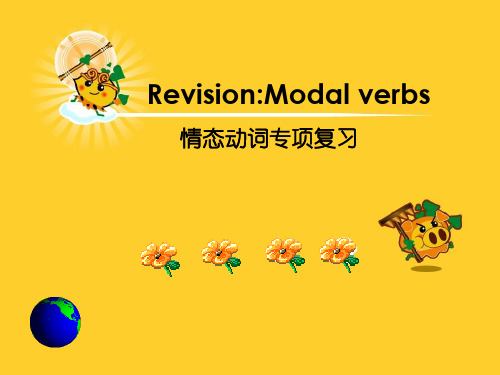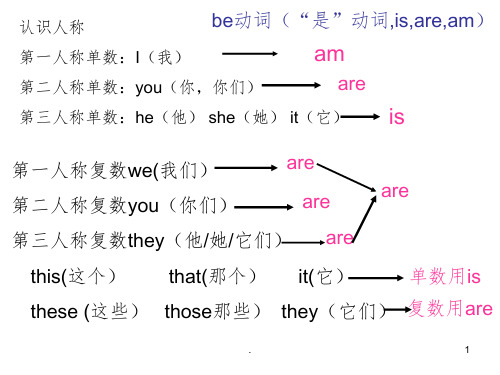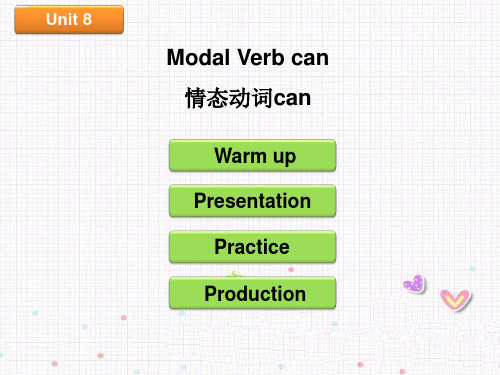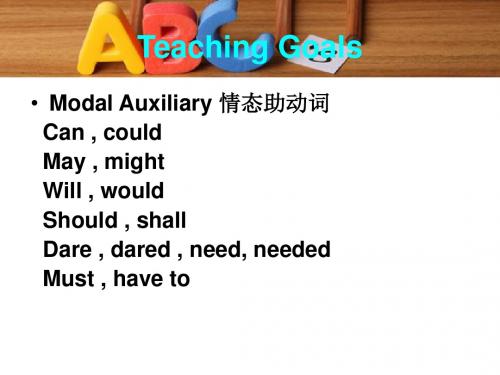情态动词CAN的用法课件
合集下载
情态动词can,may,must,need课件

Could I come to see you tomorrow?
Yes, you can. (否定答语可用No, I'm afraid not.)
用法: ①表示请求或允许 : May I go home,please? (可以)
Yes, you may. No, you _m_u_s_t_n_’_t_/_you can’t.
must开头的疑问句,其否定回答通常用 don‘t have to 或needn’t 。而不用mustn't
---Must I finish my homework first? --- Yes, you must. --- No, you don't have to/ needn't.
(需要) 既可以做情态动词, 也可以做实意动词 用法: ① 情态动词 (need do sth) I need buy a big house.
9. You ___A_____do it if you really don't
want to.
A. needn’t B. mustn’t
C. can’t
D. couldn’t
10. — Could I borrow your dictionary?
— Of course you _A_____.
5. — Fifty dollars for such a T-shirt!
You __A__ be joking!
— I’m serious. It’s made of silk.
A. must
B. need
C. may
D. can
6. — Have you decided where to go for
Yes, you can. (否定答语可用No, I'm afraid not.)
用法: ①表示请求或允许 : May I go home,please? (可以)
Yes, you may. No, you _m_u_s_t_n_’_t_/_you can’t.
must开头的疑问句,其否定回答通常用 don‘t have to 或needn’t 。而不用mustn't
---Must I finish my homework first? --- Yes, you must. --- No, you don't have to/ needn't.
(需要) 既可以做情态动词, 也可以做实意动词 用法: ① 情态动词 (need do sth) I need buy a big house.
9. You ___A_____do it if you really don't
want to.
A. needn’t B. mustn’t
C. can’t
D. couldn’t
10. — Could I borrow your dictionary?
— Of course you _A_____.
5. — Fifty dollars for such a T-shirt!
You __A__ be joking!
— I’m serious. It’s made of silk.
A. must
B. need
C. may
D. can
6. — Have you decided where to go for
情态动词can的用法PPT课件

Find out what your friend can do. (sing , swim , ride a bike , ride a horse , play the piano , play basketball , play football , play table tennis , play tennis… )
1、Lingling can’t ride a horse. 2、He ccaann’t speak Chinese. 3、Lingling and Daming ccaann’t play the
piano. 4、My father ccaann’t play table tennis. 5、She ccaann’t swim.
.
12
四、Listen to the tape,and then fill in the blanks.
Betty : Lingling , c_a_n_you play football? Lingling : Yes ,I_c_a_n_.I can _p_l_a_y_football and
I_c_a_n_play_t_e_n_n_is.But I_ca_n_’_t play_b_a_sk_e_t_b_a_ll_.
.
17
.
15
1、Can you play __C__piano? A、a B、an C、the
2、Can you dance? yes, I __B__. A、do B、can C、 can’t
3、Can he Write English? No,he __B__ A、can B、 can’t C、does
.
11
3、Lingling and Daming can play the piano.
1、Lingling can’t ride a horse. 2、He ccaann’t speak Chinese. 3、Lingling and Daming ccaann’t play the
piano. 4、My father ccaann’t play table tennis. 5、She ccaann’t swim.
.
12
四、Listen to the tape,and then fill in the blanks.
Betty : Lingling , c_a_n_you play football? Lingling : Yes ,I_c_a_n_.I can _p_l_a_y_football and
I_c_a_n_play_t_e_n_n_is.But I_ca_n_’_t play_b_a_sk_e_t_b_a_ll_.
.
17
.
15
1、Can you play __C__piano? A、a B、an C、the
2、Can you dance? yes, I __B__. A、do B、can C、 can’t
3、Can he Write English? No,he __B__ A、can B、 can’t C、does
.
11
3、Lingling and Daming can play the piano.
《情态动词》PPT课件

work our this problem. 如果你睡个好觉,那么你就能做出这个题目。 3、表示过去的能力: could表示过去一般的能力, 但不表示做或未做某事;
was/ were able to表示过去有能力并且成功地做了某事, 相当于managed to do something/ succeeded in doing something;
• Mr. Bush is on time for everything. How can it be that he was late for the opening ceremony? (表疑惑、惊讶)
表示请求、允许、允诺
1. 当对方是决策者时,你代表你(们)自己(I, We),或代表第三者(he,she,they)向对方 (you)请示或提出建议时用:
Revision:Modal verbs
情态动词专项复习
How many modal verbs
do you remember?
(情态动词)
一,常见的情态动词有:can, could, may, might ,must, shall, should, will, would, need, have to等
4、具有情态动词的某些特征的有:have(had) to, used to.
情态动词的特征
1、有一定的词义,但不能单独作谓语,它们要和行 为动词或连系动词连用,构成谓语。
2、适用于主语的各种人称和数 have to例外,主语 是第三人称单数时,要用has to)。如:
We/ He must work hard. 我们/他一定要努力工作。 I have to walk home. 我得步行回家。 He has to walk home. 他得步行回家。
was/ were able to表示过去有能力并且成功地做了某事, 相当于managed to do something/ succeeded in doing something;
• Mr. Bush is on time for everything. How can it be that he was late for the opening ceremony? (表疑惑、惊讶)
表示请求、允许、允诺
1. 当对方是决策者时,你代表你(们)自己(I, We),或代表第三者(he,she,they)向对方 (you)请示或提出建议时用:
Revision:Modal verbs
情态动词专项复习
How many modal verbs
do you remember?
(情态动词)
一,常见的情态动词有:can, could, may, might ,must, shall, should, will, would, need, have to等
4、具有情态动词的某些特征的有:have(had) to, used to.
情态动词的特征
1、有一定的词义,但不能单独作谓语,它们要和行 为动词或连系动词连用,构成谓语。
2、适用于主语的各种人称和数 have to例外,主语 是第三人称单数时,要用has to)。如:
We/ He must work hard. 我们/他一定要努力工作。 I have to walk home. 我得步行回家。 He has to walk home. 他得步行回家。
英语人教版五年级上册情态动词CAN的用法课件

2.不管人称和数变,Can 的形式 永不变!
3.否定can后加not ,一般疑问 can提前。
情动Can 表能力, 和动原不分离I have some friends:Amy,Mike and WuYifan.Amy can play the pipa.Mike can play the piano, he can play the pipa too.They can play the pipa at the party .WuYifan can play football.I like playing football.we can play football together.
微课
情态动词Can的用法
Who can be my friend?
Do you want a new friend? Try me! I am Tom ,I'm friendly . I can speak English andChinese . I can sing and dance. I have a pet dog .It can swim.
看的准 (找出句中的错误,并改正) He can swims. He cans swim.
变的快 (根据要求,变换句型)
They can play pingpong.(否定句) They can play pingpong.(一般疑问句)
Can 的歌谣
1.情动Can 表能力,和动原不 分离!
Can not = Can't I can sing.
Can you sing?
否定can后加not , 一般疑问can提前。
Can 的歌谣
1.情动Can 表能力,和动原不 分离!
2.不管人称和数变,Can 的形式 永不变!
3.否定can后加not ,一般疑问 can提前。
情动Can 表能力, 和动原不分离I have some friends:Amy,Mike and WuYifan.Amy can play the pipa.Mike can play the piano, he can play the pipa too.They can play the pipa at the party .WuYifan can play football.I like playing football.we can play football together.
微课
情态动词Can的用法
Who can be my friend?
Do you want a new friend? Try me! I am Tom ,I'm friendly . I can speak English andChinese . I can sing and dance. I have a pet dog .It can swim.
看的准 (找出句中的错误,并改正) He can swims. He cans swim.
变的快 (根据要求,变换句型)
They can play pingpong.(否定句) They can play pingpong.(一般疑问句)
Can 的歌谣
1.情动Can 表能力,和动原不 分离!
Can not = Can't I can sing.
Can you sing?
否定can后加not , 一般疑问can提前。
Can 的歌谣
1.情动Can 表能力,和动原不 分离!
2.不管人称和数变,Can 的形式 永不变!
小学情态动词Can的语法讲解ppt课件

.
2
教学目标: 1.能掌握情态动词can的基本句型变化 2.能灵活做题 3.重点:can+v.原形 4.难点:能灵活做题
.
3
情态动词can的用法:
• 情态动词本身有一定的语义,表示说话人 的情绪、态度或语气。没有人称和数的变 化,can表示“能、会”,后接动词的原形。 如:
• I can sing.
练习: 肯定陈述句 否定陈述句
2. 你会骑马 You can___r_id_e___(ride)a horse.
You can’t ride a horse.
一般疑问句
Can you ride a horse?
肯定回答
Yes,I can.
否定回答
No,I can’t. .
7
3.Lingling会游泳
.
11
练习:
一、把下列句子变为ቤተ መጻሕፍቲ ባይዱ定句。
• 1、Lingling can ride a horse. • 2、He can speak Chinese. • 3、Lingling and Daming can play the piano. • 4、My father can play table tennis. • 5、She can swim.
1.肯定句变否定句直接在can后加not,缩写为can’t。
如:I can read. →I can’t read.
2.陈述句变一般疑问句直接把can提前,其它不变照抄 如: She can swim. →Can she swim ? 肯定回答: Yes,主语+can. 否定回答: No,主语+can’t.
一般疑问句: Can you play the pipa?
高中英语教学竞赛公开课、高考复习课件——情态动词can的用法课件

➢ could比can语气
,含义较不确定。
➢ ① The moon cannot always be at the full. 月不可能常圆。
➢ ② He can’t have slept through all that noise.
➢ ③ Can it be true? (表推测)
Could it be true? (表不大可能)
三、学生训练务必得法
教师的教学能力最终要转化为学生的学习能力,对高三学生而言,就是要通过 训练转化为学生的答题能力。一是严格限时训练。限时训练就是让学生在规定 时间内做完训练题目,既训练速度,又锻炼准确度。限时训练可短可长,可以 是课前十分钟,可以是一节课,但必须坚决做到即练即评,长期坚持,通过教 师评阅提升学生答题速度和效度,做到日日清,周周清,月月清,适应高考临 场答题要求。二是严格规范答题。要认真研究高考原题和高考答案,根据学生 的答题情况认真进行比对。要把学生在考试时的原生态答卷原汁原味地展示出 来,再让学生自己对照答案进行打分、评价,找出与标准答案的差距,小组内 相互交流、讨论,制定答题标准模板,保证将来一分不丢。三是突出变式训练 。对于临界生的典型错题或遗漏知识点,要进行变式训练,一题多变进行训练 ,把错题作为“母题”,至少进行一题五变以上,让学生写出每道题的解题思路 ,最后总结出此类变式的特点和解题入手点。
从现在到一模考试前,主要任务是过课本、串教材,把基础知识再夯实, 为专题复习中国 考试评价体系及说明》和近三年高考原题,把高考考点和试题变化点做成“作战 地图”,平时考试、练习要对照“作战地图”进行选题,并在“作战地图”上一一标 注,确保考点训练无死角、考点覆盖无遗漏。 二是组织集体攻坚
二、课堂教学务必高效
课堂是教育教学是主阵地。高三年级教学时间紧,教学任务重,更要切实发挥 课堂40分钟的作用。一是上好微专题课。春节前后,一轮复习进入后期,学生 不会的知识点逐步浮出水面。这些薄弱知识点如果解决不好,将直接影响到二 轮复习的效果。高三年级要围绕浮现出来的问题,上好微专题或微微专题课, 针对某一个点或几个点精讲、讲透,触类旁通。微专题课怎么上?可以针对学 生不会的问题,每节课重点解决1-2个知识点,专题强调,专点训练,不贪多, 顺一个点“追祖宗八代”,剖析透!微微专题,则更精、更准、更小、更有效,可 以一节课只讲一道题,但是要把这一道题挖深、挖透,讲透一个会一类,做会 一题能举一反三。
最新仁爱版英语七年级下册Unit7Topic2语法专项课件(情态动词can和could的用法)

③表示请求或允许。
③表示请求,语气更委婉。
易错点1 can 和 could的区别
It can't be true. (表推测,can用于否定句) We could go there this summer. (表推测,不限句式)
易错点1 can 和 could的区别
Can I use your pen? Could I use your pen?
A. can't
B. mustn't
C. may not
D. couldn't
考查情态动词。句意: —那个人一定是萨拉的丈 夫。 —不,那不可能是她丈夫。她是单身。根据句 意,表示确切的否定的推测选用 can't ,答案选 A。
can的用法
1. 表示能力时,意为“能、会”。 例:He can speak a little Japanese. 他会说一点日语。 2. 表示请求或许可时,意为“可以”。 例:Can I help you? 要我帮忙吗?
3. 表示猜测时,意为“可能”。 例:Where can she go now? 她现在可能到哪里去了呢?
一般疑问句:could提前 Could you speak English when yld的区别
can ①表示与生俱来的能力。
could ①表示过去拥有的一般的能力。
②表推测时,只用于否定句或疑 ②表推测时,可用于肯定句、否
问句中。
定句以及疑问句。
can的句式结构
肯定句:can + 动词原形 He can speak English. 否定句:can后加not(缩写为can't) He can not (can't) speak English
初中英语语法 情态动词的基本用法课件 can和could

can 和 could
KNOWLEDGE OF GRAMMAR
情态动词表示说话者的情感、 态度和语气。它们本身有一 定的意义,但没有人称和数 的变化,不能单独作谓语。
Can/could的基本用法
表示可能性 表示能力 表示请求或允许 can的习惯用法
KNOWLEDGE OF GRAMMAR
1. 表示可能性
KNOWLEDGE OF GRAMMAR
Even experienced teachers can make mistakes. 即使有经验的老师也可能出错。
Jim can be very annoying. 吉姆有时候会很烦人。
KNOWLEDGE OF GRAMMAR
(3) can/could have done表示对过去发生的事情的推测。can have done主要用于疑问句和否定句中。
KNOWLEDGE OF GRAMMAR
Could he still be alive after all this time?
过了这么长时间,他还可能活着 吗? 表示推测时用于疑问句
KNOWLEDGE OF GRAMMAR
(2) can用于肯定句中时表示理论 上的可能性,即从理论上看有可 能,但实际未必会发生。有时指 一时的情况,常意为“有时会”。
Paul isn’t able to come because he is ill. 保罗不能来,因为他生病了。(用于一般现在时)
KNOWLEDGE OF GRAMMAR
I will be able to speak English.(✓) 我将会说英语。(用于一般将来时)
I will can speak English.(×) 我将会说英语。(can不能用于将来时)
KNOWLEDGE OF GRAMMAR
情态动词表示说话者的情感、 态度和语气。它们本身有一 定的意义,但没有人称和数 的变化,不能单独作谓语。
Can/could的基本用法
表示可能性 表示能力 表示请求或允许 can的习惯用法
KNOWLEDGE OF GRAMMAR
1. 表示可能性
KNOWLEDGE OF GRAMMAR
Even experienced teachers can make mistakes. 即使有经验的老师也可能出错。
Jim can be very annoying. 吉姆有时候会很烦人。
KNOWLEDGE OF GRAMMAR
(3) can/could have done表示对过去发生的事情的推测。can have done主要用于疑问句和否定句中。
KNOWLEDGE OF GRAMMAR
Could he still be alive after all this time?
过了这么长时间,他还可能活着 吗? 表示推测时用于疑问句
KNOWLEDGE OF GRAMMAR
(2) can用于肯定句中时表示理论 上的可能性,即从理论上看有可 能,但实际未必会发生。有时指 一时的情况,常意为“有时会”。
Paul isn’t able to come because he is ill. 保罗不能来,因为他生病了。(用于一般现在时)
KNOWLEDGE OF GRAMMAR
I will be able to speak English.(✓) 我将会说英语。(用于一般将来时)
I will can speak English.(×) 我将会说英语。(can不能用于将来时)
小学英语语法课件-情态动词can PPT课件 全国通用

Dolphins can jump high and do tricks. Dolphins can’t fly. — Can dolphins see well and make lots of sounds? — Yes, they can. What can dolphins do?
小 学 英 语 语 法课件 -情态动 词can P PT课 件 全 国 通用
小 学 英 语 语 法课件 -情态动 词can P PT课 件 全 国 通用
Presentation
Sentences
1. 肯定句:主语+can +动词原形+其他 I can dance. 我会跳舞。
2. 否定句:主语+can’t+动词原形+其他 I can’t dance. 我不会跳舞。
3. 一般疑问句及回答:Can+主语+动词原形+其他? — Can you dance? 你会跳舞吗? — Yes, I can. / No, I can’t. 是的,我会。/不,我不会。
Sentences
He can’t be at home. 他不可能在家。 Can he come here today, please? 请问他今天能来这里吗?
can在句中表示可能,常用于否定句或疑问句中,指某种 可能性。
小 学 英 语 语 法课件 -情态动 词can P PT课 件 全 国 通用
小 学 英 语 语 法课件 -情态动 词can P PT课 件 全 国 通用
小 学 英 语 语 法课件 -情态动 词can P PT课 件 全 国 通用
Presentation
Sentences
Koalas and polar bears can climb fast and swim fast. Koalas and polar bears can’t fly. — Can koalas and polar bears eat fish and plants? — Yes, they can. What can koalas and polar bears do?
高考英语情态动词课件(共21张PPT)

He shall get his money.
5)Should 表示说话人的惊奇、愤怒、失望等特殊情感 It’s surprising that Mary should love such a person as Jack. It’s strange that … It’s unthinkable that … I’m sorry that…
肯定疑问 Dare we run? 句
Do we dare (to) run?
否定疑问 Dare he not run? Doesn’t he dare to run ? 句
Need, needed
Need /needed
1、情态动词用于否定句,疑问句 He needn’t worry about it.
This will be the house you're looking for .
Will , would
5)would常用于虚拟条件句,表示与事实相反或不太可能实现的情况 But for your help we would have been late .
6) Would 表示过去的习惯性动作或某人的一典型动作,又使人厌烦的感 觉。 He would go swimming in summer when he was in the countryside.
3.表示请求和允许,与may同义,相当于be allowed to.常用语口语中。 You can smoke in this room. Could I borrow you dictionary?
Can , could
4.用于一些固定句型 a. Cannot ( can never) …too…怎么也不过分
如询问某种可能时,应用can。 He must know my address. (一定) He can’t know my address. (一定不) Can he know my address? (询问可能性)
5)Should 表示说话人的惊奇、愤怒、失望等特殊情感 It’s surprising that Mary should love such a person as Jack. It’s strange that … It’s unthinkable that … I’m sorry that…
肯定疑问 Dare we run? 句
Do we dare (to) run?
否定疑问 Dare he not run? Doesn’t he dare to run ? 句
Need, needed
Need /needed
1、情态动词用于否定句,疑问句 He needn’t worry about it.
This will be the house you're looking for .
Will , would
5)would常用于虚拟条件句,表示与事实相反或不太可能实现的情况 But for your help we would have been late .
6) Would 表示过去的习惯性动作或某人的一典型动作,又使人厌烦的感 觉。 He would go swimming in summer when he was in the countryside.
3.表示请求和允许,与may同义,相当于be allowed to.常用语口语中。 You can smoke in this room. Could I borrow you dictionary?
Can , could
4.用于一些固定句型 a. Cannot ( can never) …too…怎么也不过分
如询问某种可能时,应用can。 He must know my address. (一定) He can’t know my address. (一定不) Can he know my address? (询问可能性)
情态动词can和could之基本用法课件

注意事项二:注意情态动词的否定形式
注意点描述
情态动词的否定形式通常为在情态动词后加 not,缩写为n't。学习者需要注意否定形式 的正确运用。
示例
例如,"He can't come to the party because he has to work."(他不能来参加 聚会,因为他必须工作。)中,can't是情 态动词can的否定形式。
情态动词与其他动词结合 使用,可以构成各种时态 和语态,如现在时、过去 时、将来时、进行时、完
成时等。
替代实义动词
在某些情况下,情态动词 可以替代实义动词,表示 说话者的意愿或建议,如 “I can go with you”(
我可以和你一起去)。
常见情态动词
can
表示能力、可能性或允许,如“I can swim”(我会游泳)。
误区二:忽视情态动词与其他动词的搭配使用
误区描述
学习者在使用情态动词时,有时会忽视它们与其他动词的搭配使用,导致句子表达不清或不准确。
正确用法
情态动词后应接动词原形,表示对动作或状态的推测、判断或假设。例如,"She may go to the park tomorrow."(她明天可能会去公园。)中,may后面接的是动词原形go。
特殊疑问句
Where could she be?(她可能在哪里?)
06
常见误区与注意事项
误区一:混淆can与could的用法
误区描述
许多学习者常常混淆can与could的用法,认为二者可以随意互换。
正确用法
can表示现在或将来的能力或可能性,而could则表示过去的能力或可能性。例如,"I can swim."(我会游泳) 表示现在的能力,而"I could swim when I was a child."(我小时候会游泳)表示过去的能力。
情态动词can微课课件

(我会使用电脑,但不会开车)
I can drive a car ,
but can’t speak English
(我会开车,但不会说英语)
can在不同的人称、单复数后,形式不变
I can teach English
You can repair computers
can在不同的人称、单复数后,形式不变
Tory
can use the computer can speak English
can repair the computer can read English book
Abilities: can drive a car
can teach English
(能力)
can’t speak English can’t repair the -
…
computer
…
…
…
can play basketball can run fast can jump high can’t speak English … …
小结
用法口诀: 情动can表能力,行为动词不分离 不管主语如何变,can的模样永不变 只要出现情动can,动词原形后边站
Thank you
They can speak in English
I You He / she /it We You They
+ can + v 原型
• The job fair (招聘会)
what the jobs are suitable for me ?
(什么职业适合我呢?)
Name
Wang Tong
Sally Smith
• The job fair (招聘会)
I can drive a car ,
but can’t speak English
(我会开车,但不会说英语)
can在不同的人称、单复数后,形式不变
I can teach English
You can repair computers
can在不同的人称、单复数后,形式不变
Tory
can use the computer can speak English
can repair the computer can read English book
Abilities: can drive a car
can teach English
(能力)
can’t speak English can’t repair the -
…
computer
…
…
…
can play basketball can run fast can jump high can’t speak English … …
小结
用法口诀: 情动can表能力,行为动词不分离 不管主语如何变,can的模样永不变 只要出现情动can,动词原形后边站
Thank you
They can speak in English
I You He / she /it We You They
+ can + v 原型
• The job fair (招聘会)
what the jobs are suitable for me ?
(什么职业适合我呢?)
Name
Wang Tong
Sally Smith
• The job fair (招聘会)
高中英语情态动词各种用法课件(共47张PPT)

一 、表能力 :表现在的或一般的能力:表示 现在的或一般的能力用can 或 be able to. 一 般的能力是指你无论什么时候做什么事情就 能做到的能力。表示现在的能力或一般的能 力时,can比be able to 更普遍。
A computer can’t think for itself; it must be told what to do. (表示一般的能力)
This can’t / couldn’t be done by him. (表示不 相信)
He could be on his way home now. (could 不 如 may / might常用)
Can this be done by him? (表示一种疑惑、 惊讶)
(3)would, could, should, might 并不一定 与过去的时间有关,而是表示可能性弱于他 们相应的现在形式。如:
do something / succeeded in doing sth.
The fire spread through the hotel very
quickly but everyone was able to get out. (过去有能力并成功地做了某事)
(3) could have + 过去分词,表示过去有 能力做但未做。
表示对过去已经发生的行为进行推测,意为 “想必 / 准是/ 一定做了某事
It must have rained last night, for the road was quite muddy.
The lights were out. They must have been asleep.
2. can have done
情态动词can的用法课件

情态动词表示说话人对某一动作 或状态的态度或看法,包括可能 性、必要性、意愿等。
特点
情态动词没有人称和数的变化, 其后必须接动词原形。
情态动词分类
可能性情态动词
can, could, may, might
必要性情态动词
must, should, ought to
意愿性情态动词
will, would, shall, should
混淆can与may的用法
03
can表示能力和可能性,而may表示推测或允许,两者在语境中
应区分使用。
情态动词can拓展知识点
情态动词can的过去式
could,用法与can相似,但语气更委婉。
情态动词can与其他情态动词连用
如“You should can do it.”(你应该能做到。)表示强调。
用could表示推测与猜测
要点一
could用于推测过去或现在
could是can的过去式,但也可以用于表示对现在或过去的 推测,例如,“He could be busy.”(他可能很忙。)
要点二
could表示猜测的语气
与can相比,could表示的猜测语气更为委婉或不确定,通 常用于表示基于不完全信息或主观判断的推测,例如, “It could be a good idea.”(这可能是个好主意。)
情态动词can的用法课件
目录
CONTENTS
• 情态动词can基本概念 • 情态动词can表示能力 • 情态动词can表示可能性与推测 • 情态动词can与其他情态动词比较 • 情态动词can在特殊句型中的运用 • 情态动词can总结与拓展
01
CHAPTER
情态动词can基本概念
特点
情态动词没有人称和数的变化, 其后必须接动词原形。
情态动词分类
可能性情态动词
can, could, may, might
必要性情态动词
must, should, ought to
意愿性情态动词
will, would, shall, should
混淆can与may的用法
03
can表示能力和可能性,而may表示推测或允许,两者在语境中
应区分使用。
情态动词can拓展知识点
情态动词can的过去式
could,用法与can相似,但语气更委婉。
情态动词can与其他情态动词连用
如“You should can do it.”(你应该能做到。)表示强调。
用could表示推测与猜测
要点一
could用于推测过去或现在
could是can的过去式,但也可以用于表示对现在或过去的 推测,例如,“He could be busy.”(他可能很忙。)
要点二
could表示猜测的语气
与can相比,could表示的猜测语气更为委婉或不确定,通 常用于表示基于不完全信息或主观判断的推测,例如, “It could be a good idea.”(这可能是个好主意。)
情态动词can的用法课件
目录
CONTENTS
• 情态动词can基本概念 • 情态动词can表示能力 • 情态动词can表示可能性与推测 • 情态动词can与其他情态动词比较 • 情态动词can在特殊句型中的运用 • 情态动词can总结与拓展
01
CHAPTER
情态动词can基本概念
- 1、下载文档前请自行甄别文档内容的完整性,平台不提供额外的编辑、内容补充、找答案等附加服务。
- 2、"仅部分预览"的文档,不可在线预览部分如存在完整性等问题,可反馈申请退款(可完整预览的文档不适用该条件!)。
- 3、如文档侵犯您的权益,请联系客服反馈,我们会尽快为您处理(人工客服工作时间:9:00-18:30)。
情态动词can没有人称和数 的变化,即表达“某人会(不 会)做某事”用“can(can’t)+ 动词原形”。
含情态动词 can的一般疑问 句,直接将can提至句首,回 答的主语和问句的主语要一 致。
三、把下列句子变为一般疑问句并 作肯定和否定回答。
1、Lingling can swim.
Can Lingling swim?
二、翻译下列句子。
▪ 1.我能扫地。 We can sweep the floor.
▪
▪ 2.你能做饭。 You can cook the meals.
▪
▪ 3.他能浇花。 He can water the flowers.
▪
▪ 4.她能唱歌。 She can sing a song.
▪
▪ 5.我们能檫窗户。We can clean the windows.
I can play chess. But Ic_a_n_’_t play_b_as_k_e_t_b_a_ll_. Betty : C__an___you play c_h_e_s_s? Lingling : No, I can’t . B__u_t _I can_s_w_i_m__.
1、贝蒂会说英语,但她不会说中文。 Betty _c_an__ s_p_e_a_k English,_b_u_t_she_c_a_n_’tspeak Chinese.
情态动词CAN的用法
sing
swim
play table tennis
play the piano
play basketball
play football
情态动词本身有一定的
词义,表示说话人的情绪, 态度或语气。
can是情态动词,表示 “能,会”。
一.翻译下列词组,并用这些词组和情态 动词can口头造句.
Yes, we can. No, we can’t.
6.含情态动词 can的特殊疑问句 句子结构是:疑问词 + can + 主语 + 动词原形或动词短语? 回答的主语和问句的主语要一致。 My mother can cook the meal.(根据划线部分提问 )
What can your mother do?
e gym.
Where can my father play table tennis?
5. Our classmates can go hiking on Sunday.
When can our classmates go hiking?
一、Say what the people in the picture can do. (根据图片写出句子)
She can sing.
She can not sing.
swim
He can swim. He can not swim. .
含情态动词can的否定 句,直接在情态动词can 后加not,成为can not,缩写 为can’t。
倒垃圾_e_m_p_ty_t_h_e_tr_a_s_h 做饭_c_o_o_k_t_he__m_e_a_ls 浇花_w__at_e_r_th_e_f_lo_w_ers 打扫卧室c_le_a_n_t_h_e _be_d_room 铺床__m_a_k_e_t_h_e_b_ed_ 摆饭桌___se_t_th_e__ta_b_le_ 洗衣服_w_a_sh__th_e_c_lo_t_h_es 画 画_dr_a_w_p_i_c_tu_r_es__ 洗碗碟___d_o _th_e_d_i_sh_e_s 玩电脑游戏__p_la_y_c_o_m_p_u_t_er games
Yes,she can. / No,she can’t.
2、I can speak Chinese.
Can you speak Chinese?
Yes,I can. / No,I can’t.
3、Lingling and Daming can play the piano.
Can Lingling and Daming play the piano?
Yes,they can. / No,they can’t .
4、My father can play table tennis.
Can your father play table tennis?
Yes,he can. / No,he can’t .
5.Our classmates can go hiking on Sunday. Can our classmates go hiking on Sunday?
二、把下列句子变为否定句。
1、Lingling can’t play the guitar. 2、He ccaann’t speak Chinese. 3、Lingling and Daming ccaann’t play the
piano. 4、My father ccaann’t play table tennis. 5、She ccaann’t swim.
2、你的朋友会跳舞吗?——会。 _C_a_n_ your friends d_a_n_c_e ? Yes , _th_e_y_ can.
3、那个女孩不会打网球。 The girl _c_an_’_t _p_l_a_y tennis.
四、根据划线部分提问。
1、Lingling can swim.
What can Lingling do?
2、I can speak Chinese.
What can I speak?
3.Lingling and Daming can play the piano.
Who can play the piano?
四、Listen to the tape,and then fill in the blanks.
Betty : Lingling , c_a_n_you play _fo_o_t_b_a_ll_? Lingling : Yes ,I_c_a_n_.I can _p_l_a_y_football and
